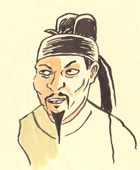Chinese poetry is much different than its Western counterpart. Each Chinese character is a word/picture. Because the characters have remained essentially unchanged for thousands of years, each holds an emotional charge and racial memory. The characters cascade down the page, each painting a picture, evoking an emotion. Each character builds on the last and acts as a foundation for the next. As you gaze upon the poem, you see the symbol for river. In the column next to the symbol for river is a snowy egret feeding among the rushes. As you enter deeper into the maze/poem, you hear the clatter of oxcart wheels on hard-packed dirt and smell the sweat of the animals as they pass. You see the sorrowful faces of conscripts trudging behind the cart. The quality of the author’s brushstroke imparts a nuance of meaning that is further enhanced by the quality of ink used, and the paper itself creates a subtext of thought. Chinese poetry is a three dimensional living thing that leaps off the page and enrobes you in its images and textures, leaving the reader with a memory that will be built upon by future poets.
Arguably, the master of this type of writing was Tu Fu. Born to a literary family in the Hunan Province of China in 712, his family’s social position assured Tu Fu a traditional Confucian education. Perhaps through intrigue, or because of his radical views, Tu Fu failed an Imperial test in 736, which, if he had passed, would have guaranteed him a civil service post and a life of relative security. After failing the test, he traveled throughout China and earned a reputation as a humanistic poet well grounded in reality. It was during this time that he met his idol, the poet Li Po, a Taoist who celebrated the virtues of love, wine, and nature. The two traveled together for a while and Tu Fu dabbled in Taoism, but was unable to balance the world he lived in with the disassociation of Taoism, and soon returned to the capital and Confucianism.
Tu Fu was well regarded during the 740s, even though he held no official position, had no money, and failed a second Imperial examination. In the mid 750s he sought and attained Imperial recognition in the form of a minor appointment, married, and acquired some land. |






